- Home
- Captain W E Johns
27 Biggles - Charter Pilot Page 2
27 Biggles - Charter Pilot Read online
Page 2
That was our first trip with Dr. Augustus Duck, but it wasn't the last, by a long shot. He was tickled to death with flying as a quick means of getting about, and as he had plenty of money, he must go rushing off all over the face of the earth to solve the biological mysteries about which he had been collecting information for years. I'll tell you about some of those trips another day.
Ginger turned to Henry. "Now perhaps you understand what I mean when I say that it doesn't do to disbelieve a thing because you haven't seen it yourself. Wait till I tell you about—"
Biggles broke in. I think that will do for one evening," he said, looking at the clock. "It's time we went to bed. The squadron's on early patrol in the morning, don't forget."
II
THE ADVENTURE OF THE ABOMINABLE
CAVEMAN
LUNCH over, the members of Biggles's squadron had passed into the ante-room, there to amuse themselves according to individual taste until two o'clock, when the squadron was scheduled for gunnery practice.
Lord Bertie Lissie picked up a picture magazine devoted to topical events, and flipping idly through the pages stopped at a photograph depicting the re-occupation of Abyssinia.
"I say, you know," he remarked, adjusting his monocle, "the jolly old Abyssinians look a wild and woolly lot, don't they? I mean to say—look at their mops of fuzzy hair. Pretty ferocious, what ? "
"Yes, they're tough," agreed Ginger. "They remind me of—but never mind."
"Here, come on, you can't leave it like that, you know," protested Bertie. "What do they remind you of ? "
"For a guess, I should say they remind him of the Abominable Caveman," put in Biggles, smiling.
"Was he another one of the weird and wonderful animals you encountered during your tour with Dr. Augustus Duck ? " inquired Tug Carrington, a trifle sarcastically.
"Yes, but he wasn't an animal," returned Biggles. " Bishimbi was a man."
" Bishimbi ? "
"That's what the natives called him."
"The natives of where?" demanded Tex O'Hara. "The original natives of Walleroo Island."
"Where's that ? "
Algy Lacy tossed aside the book he was trying to read. "Better tell them the story, Biggles," he said sadly. "Now you've said as much as you have they won't be satisfied until they hear the rest."
"Ginger can tell it," returned Biggles. "He's better at this sort of thing than I am. Go ahead, Ginger."
Ginger settled back on the settee while the others gathered round, and this is the story he told:
As you will have guessed, the first we knew about the existence of the Abominable Caveman was through Donald, otherwise Dr. Augustus Duck. We were in Africa when he remembered this particular gentleman, so he turned up his notes about him in what he called his register of rare events. In order that you may get a clear picture of the scene of action I'll tell you, in as few words as possible, what Donald's register revealed.
Strung out along the south-west coast of Africa are scores of islands, some large, some small. For the most part they are wild, devoid of vegetation, and inhabited by seals, penguins, and countless millions of sea-birds. Between them and the mainland the tides rage and race, making navigation difficult, and as there are few harbours, ships give the islands a wide berth. For this reason most of the islands are uninhabited, and nobody hears much about them. The one with which we are concerned is called Walleroo Island, which really means Labyrinth Island. No doubt the original natives named it that because the rock of which it is composed is honeycombed with caves. Over thousands of years the breakers of the South Atlantic have bored right into the heart of the island, so when a big sea is running it shakes like a jelly; this, I may tell you, is a bit alarming until you get used to it. It isn't as bad as Mercury Island, a little lower down the coast, where seas meet under the middle of the island and leap up through a blow-hole in the centre.
Labyrinth Island is British. It's about five piles long and three-quarters of a mile wide.
About twelve miles from the southern tip is another island called Wreck Island. At one time it was German, but after the last war the South African Government took it over and leased it to a private whaling company as a depot for their ships. Both islands are roughly twenty miles from the mainland.
At the time of which I am speaking, Labyrinth Island was uninhabited except for a monster called the Abominable Caveman—the expression being a literal translation from the language of the Hottentots whom it put to flight. Apparently, the first inhabitants of the island were Portuguese; some five centuries ago, no doubt because Labyrinth Island has a harbour, Portuguese ships were in the habit of calling there for rain-water which lies about in the pot-holes. A little settlement sprang up. The settlers built a village of tiny stone houses which are still there. When or why they went nobody seems to know.
Perhaps they got fed up with
the place, which is hardly to be wondered at, for of all the dismal places I've ever seen Labyrinth Island is about the worst. Anyhow, they went, leaving behind them the houses, a church and a graveyard—of which you will hear more presently.
In comparatively recent times the village was occupied by Hottentots from the mainland.
They didn't go there because they liked it. They went there at the request of the Government to collect penguin eggs, which have a ready sale in South Africa and in swagger London hotels. They fetch around a shilling apiece, and as the Hottentots got a fair share of the profits they did very well indeed. A Government cutter used to call for the eggs every two or three weeks and leave stores for the collectors. One day the cutter called to find the egg-collectors in a funny mood. For a long time they wouldn't say what was wrong, but eventually they admitted that they were being frightened out of their wits by something which they called the Abominable Caveman. They described it as a hairy giant in human form who made the night hideous with his howlings, and amused himself by disinterring the corpses from the graveyard and gnawing the bones. At least, he left the bones scattered about, so the natives assumed that was what he did. Well, the cutter men told the natives not to be silly, and sailed away. The next time they called there were no eggs and no collectors. They'd gone. Some were afterwards rounded up on the mainland, and they admitted that they couldn't stand life on the island with an Abominable Caveman prowling about.
Now all this, which occurred two or three years before our visit, was a serious blow for the Government. Naturally, they sent watchers to the island, but not a sign of the horrific caveman did they see. What, then, had the natives seen? That they had seen something was certain, for when questioned the description given by each man was identical. They described the Abominable Caveman as a huge, hairy man who leapt from rock to rock swinging a mighty club. He was never seen during the day, but at night he roamed the island, howling and snarling. At dawn he disappeared into one of the count, less caves that honeycombed the rocks. What was this
creature? Was it man or beast? That was what Donald decided to find out.
Landing at the island was a tricky business. There was no question of landing on the island ; it was much too dangerous. Even the sandy area near the sea was hopeless because it was pitted with the burrows which penguins call their nests, and dotted with other big seabirds. We had to be careful of birds on the wing, too; the air was thick with them. Some of them were pretty hefty birds, and an aircraft colliding with one of them would come off badly. There was an ugly swell running, even in the alleged harbour, but as this rarely stops, even in fair weather, we had to risk landing on it. However, Biggles managed to get the Wanderer down on the water, after which, not without difficulty, we taxied on to a shelving stretch of beach, and anchored the machine to the ground with ropes and sandbags.
Then we set out to explore. Naturally, we were armed—that is, all except Donald. He still wore his top hat and frock coat, and carried a camera. He had a crazy idea that we might be able to capture the Abominable Caveman alive, but failing that a photograph would have to do.
/>
Picking our way between the nesting birds, we made for the village. I mention this picking our way because the penguins would not move for us, and if you got too close you were liable to get a dagger in your foot—the dagger being a penguin's beak. Apart from penguins and sea-birds, we saw a few seals on the beach, but nothing else.
The village was a melancholy looking place, grass-grown, windows- out, doors flapping in the wind. I'm not soft, but there's something sad about an abandoned human habitation. Nor am I superstitious, but I could imagine the ghosts of the old Portuguese settlers haunting the little houses they built with so much labour. In the churchyard, among the mouldering wooden crosses, we found the first confirmation of the caveman story. The bodies had been buried in shallow earth on account of the bethock; now bones and skulls lay scattered about. It wasn't a pretty sight, and I don't mind admitting it gave me the willies. Biggles had a look round ; he said nothing, but I could see that he had got his thinking cap on.
" Well, I think that's all there is to see here," he said at last. " Let's work round the outside of the island."
For a long time we saw nothing unusual. An old man seal came at me, all teeth and hair; he looked a dangerous customer, and if we hadn't been warned by the Government officials at Capetown, when we got our permit to explore the island, that the island was a seal sanctuary, I should have put a bullet through him. As it was I had to bolt.
Then, rounding a shoulder of rock, we came upon a Cove with a little shelving beach.
With one accord we stopped dead, staring. You never saw such a sight in your life as met our gaze. The place was a shambles. Blood was everywhere. There was blood on the sand and blood on the rocks; even the water at the edge of the sea was crimson. Talk about a battlefield ! But there were no bodies, dead or alive. The only living creatures in sight were sharks in the sea, and there were plenty of them. Nasty-looking triangular dorsal fins were cutting through the water in all directions—scores of them; and I don't wonder at it.
"Nice place for a bathe," remarked Biggles, looking at the seething water.
"Nice place for a picnic," sneered Algy.
Dear me, whatever has been going on?" said Donald seriously, looking a bit pale about the gills. " This is really terrible."
"It looks as if the Abominable Caveman has been behaving abominably," said Biggles. "
It rather looks, too, as if there are several of them. I can't imagine one man making such a mess."
With that Biggles stooped down, dipped his fingers in the blood and smelt it. He didn't say anything. Neither did we. There didn't seem to be anything to say. Had it been left to me I should have been in the air, homeward bound, in five minutes. Evidently this caveman was something to be reckoned with, and as far as I was concerned somebody else could do the reckoning.
Biggles led the way back to the Wanderer. I could see he was doing a powerful lot of thinking. By the time we got to the machine it was beginning to grow dark.
"Let's get her on the water," said Biggles.
"That sounds a good idea to me," I declared. "You won't be going," announced Biggles.
"What do you mean?" I asked, not a little shaken.
Biggles took Algy on one side and had a quiet conversation with him. Algy nodded.
Then they came back.
" Algy is flying down to Capetown right away," said Biggles. "The rest of us are going to stay here."
I demand an explanation!" cried Donald, looking a bit upset.
As you're paying for the trip, you're entitled to one," Biggles told him. "My object is to produce the Abominable Caveman—that's why we came here. Something, or somebody—I don't know who or what, although I have an idea—I say, something is on this island, and as we arrived with a certain amount of unavoidable noise, the creature must know perfectly well that we are here. It's quite likely that he's been watching us from one of the caves. When he sees the aircraft leave he'll think we've all gone and emerge from his lair-at least, that's what I hope. Algy will return in the morning to pick us up."
" Excellent ! "cried Donald, who was afraid of nothing.
Well, we got the Wanderer on the water and Algy departed for Capetown. We lay low among the rocks until it was dark, and then, very quietly, made our way to the deserted village. We parked ourselves in a room with a window on each side and settled down to wait. It was an eerie business, with the churchyard so close, and bones and things scattered about. It was pretty dark at first although the sky was clear; then the moon, which was nearly full, came up, and made the place nearly as light as day. It must have been about twelve o'clock when I felt Biggles stiffen.
"There he is," he breathed.
We looked, and there, sure enough, silhouetted against the skyline, standing quite still, was a huge, hairy figure, holding in its hand an enormous club.
"Let's go and grab him," whispered the Doctor.
"Certainly not, replied Biggles. "He'd knock our brains out with one sweep of that club ; yet if we shot him we might be held on a charge of murder."
Presently the figure began to move off along the ridge, and shortly afterwards we lost sight of it.
"There, now we've lost him," whispered the Doctor.
"Follow me, but don't make a sound," ordered Biggles, and leaving the house he began creeping like an Indian towards the ridge over which the caveman had disappeared. It was slow work. Beyond the ridge was another, another and another. We had to go slowly because we didn't want to bump into the blighter, and I suppose it must have taken us the best part of three hours to get to the last ridge, by which time we were at the extreme southern tip of the island. At this point there were cliffs about eighty feet high, and below, a narrow strip of sand. We looked down, but jumped back when we saw a light.
" Ah ! He understands fire," whispered Donald.
"He understands more than that," said Biggles softly. "We'll wait for daylight before we move—it won't be long."
Well, we squatted among the rocks behind the edge of the cliff until it got light, and then we looked down again. For some minutes I had thought, or imagined, that I could hear voices, and as soon as I looked down I saw that I hadn't been mistaken. There were seven men on the narrow strip of beach. About fifty yards away, in a little cove, rode a sailing dinghy. Biggles didn't seem in the least surprised.
Something was certainly going on, but I'm dashed if I could see what it was. The men seemed to be carrying out from a cave great bundles of sloppy stuff; and piling them in a heap.
"Who are these men?" whispered Donald.
Biggles looked at him with a funny little smile on his face.
Skin poachers," he
answered.
"You mean those bundles are skins?" gasped Donald.
"Yes. Sealskins worth a small fortune. You haven't forgotten that this is a seal sanctuary, or that it belongs to the South African Government? The men have evidently come over here from Wreck Island, or from the mainland. The Abominable Caveman's job was to frighten the natives away. I suspected What was going on as soon as I saw all that blood.
That's where the seals were massacred, clubbed to death. You see, if you shoot a seal you make a hole in the pelt and ruin it. The carcasses were flung into the sea-hence the sharks. Stay where you are."
Without saying what he was going to do, Biggles went off, and presently I saw him going down the cliff at a:- place where it was not too difficult, and where he couldn't be seen by the men on the beach. He went straight to
the dinghy, picked upa rock, and smashed it through the floorboards. It sank immediately. Then he came back
to us.
"That's queered their little game," he announced with satisfaction. "They're prisoners on the island now."
"And what about us?" I asked.
"You'll see," was all Biggles would tell me.
Well, after a little while the men began carrying the bundles of blood-stained skins along to the dinghy—or rather, to the place where the dinghy had been. When they found it wa
s no longer there, my word ! What a fuss they kicked up ! The painter was still made fast to a rock, so by hauling on it they were able to pull the dinghy up. When they saw the hole knocked through the bottom—that did it. They must have known then that they weren't alone on the island, and one of them, happening to look up, spotted us looking down. He gave the alarm. Drawing revolvers, the whole gang started after us.
We retreated to the next ridge and held them off with our rifles until eleven o'clock, when the Wanderer came back, bringing not only Algy but four police officers, all armed. That was too much for the smugglers and they tried to bolt—not that they could have got away, anyhow. But they were cut off by a posse of sailors who, unknown to us, and to them, had landed farther down.
It turned out afterwards that the officer in Capetown to whom Algy had reported had radioed a coastal patrol boat to make for the island and do any cleaning up that was necessary.
Well, that's really all there was to it. The men were arrested, caught red-handed—
literally, for the bloodstained pelts were still on the beach. One of them turned King's evidence. He declared that the whaling station on the next island was only a blind. The gang had been raiding the seal island regularly for nearly two years. No wonder we didn't see many seals ! The gang had made a lot of money, and if they'd had the sense to stop, or if Donald's curiosity hadn't taken us to the spot, they'd have got away with it. As it was they got long terms of imprisonment.
They'd made their plans carefully. Of course, they couldn't start operations while the Hottentots were living on the island, so they hit upon the scheme of frightening them away—not a difficult matter—with this Abominable Caveman nonsense. The caveman, of course, was one of the gang, a big negro with two or three goat skins tied round him.

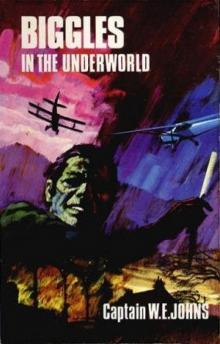 Biggles in the Underworld
Biggles in the Underworld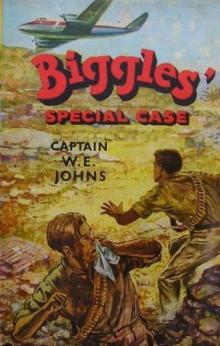 Biggles' Special Case
Biggles' Special Case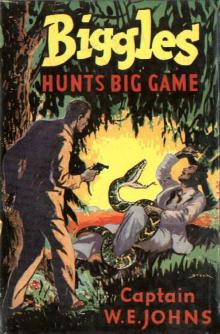 34 Biggles Hunts Big Game
34 Biggles Hunts Big Game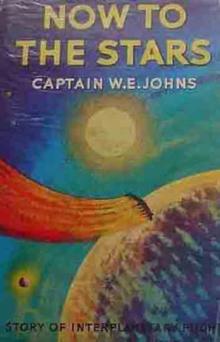 03 Now To The Stars
03 Now To The Stars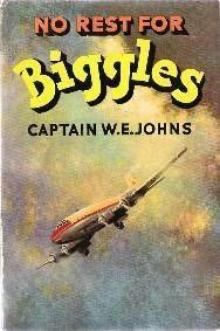 55 No Rest For Biggles
55 No Rest For Biggles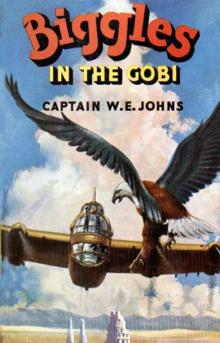 46 Biggles in the Gobi
46 Biggles in the Gobi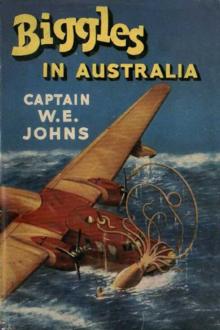 52 Biggles In Australia
52 Biggles In Australia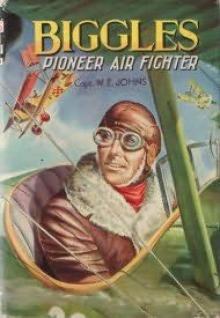 51 Biggles Pioneer Air Fighter
51 Biggles Pioneer Air Fighter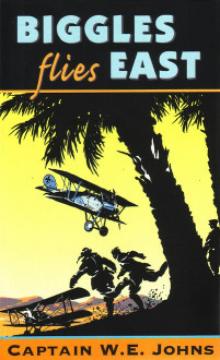 05 Biggles Flies East
05 Biggles Flies East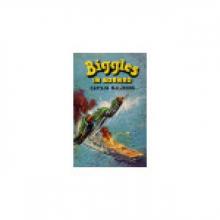 28 Biggles In Borneo
28 Biggles In Borneo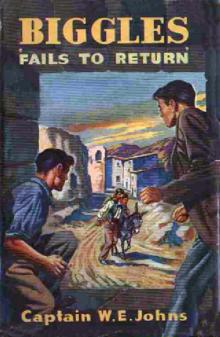 29 Biggles Fails to Return
29 Biggles Fails to Return 55 No Rest For Biggles (v2)
55 No Rest For Biggles (v2) Biggles Does Some Homework
Biggles Does Some Homework Biggles of the Camel Squadron
Biggles of the Camel Squadron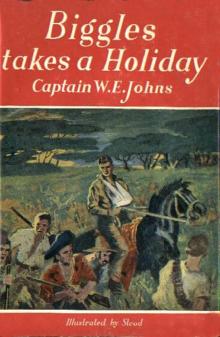 35 Biggles Takes A Holiday
35 Biggles Takes A Holiday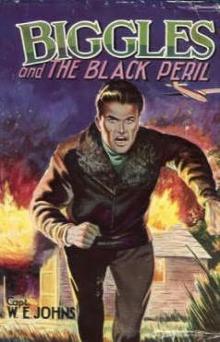 Biggles And The Black Peril (06)
Biggles And The Black Peril (06) 17 Biggles And The Rescue Flight
17 Biggles And The Rescue Flight Biggles Learns To Fly
Biggles Learns To Fly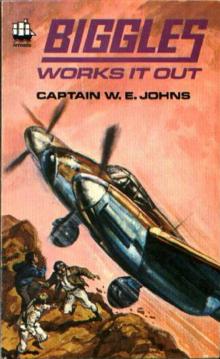 40 Biggles Works It Out
40 Biggles Works It Out 05 Biggles Learns To Fly
05 Biggles Learns To Fly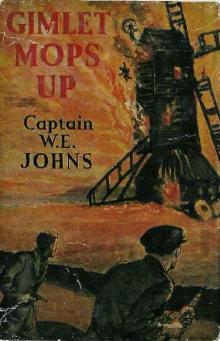 04 Gimlet Mops Up
04 Gimlet Mops Up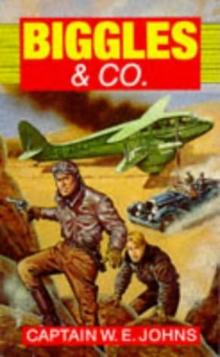 10 Biggles and Co
10 Biggles and Co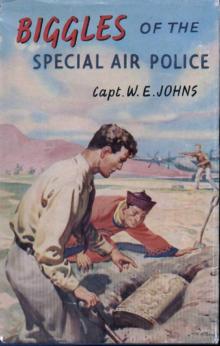 47 Biggles Of The Special Air Police
47 Biggles Of The Special Air Police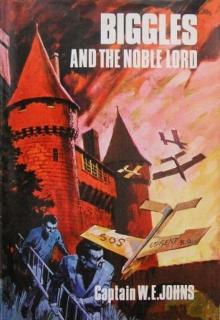 Biggles and the Noble Lord
Biggles and the Noble Lord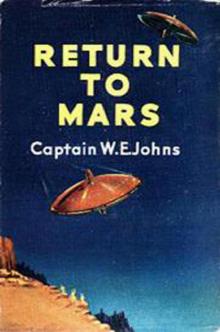 T2 Return To Mars
T2 Return To Mars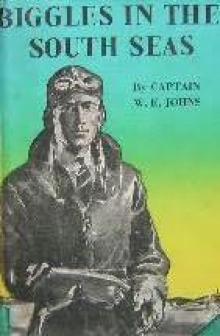 21 Biggles In the South Seas
21 Biggles In the South Seas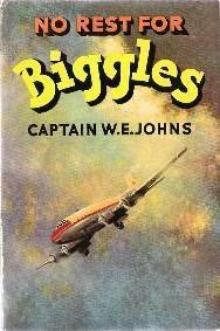 No Rest For Biggles
No Rest For Biggles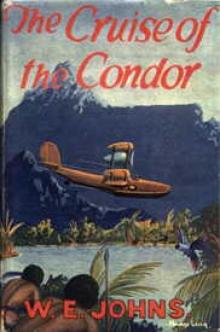 Biggles In The Cruise Of The Condor (02)
Biggles In The Cruise Of The Condor (02)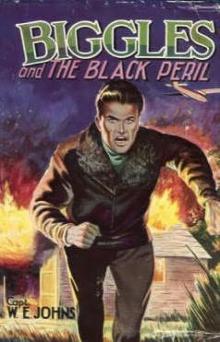 06 Biggles And The Black Peril
06 Biggles And The Black Peril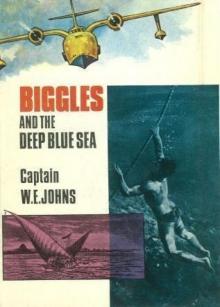 Biggles and the Deep Blue Sea
Biggles and the Deep Blue Sea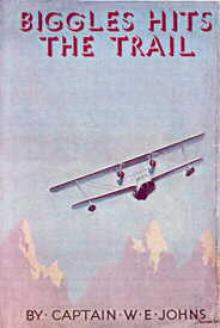 06 Biggles Hits The Trail
06 Biggles Hits The Trail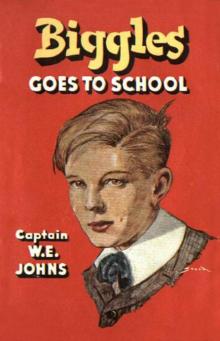 39 Biggles Goes To School
39 Biggles Goes To School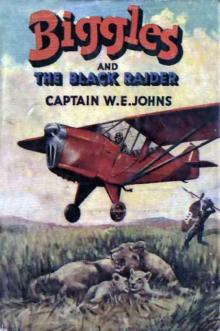 44 Biggles and the Black Raider
44 Biggles and the Black Raider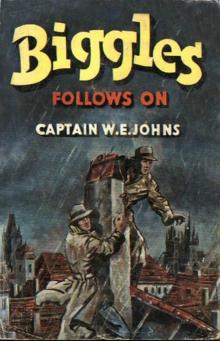 42 Biggles Follows On
42 Biggles Follows On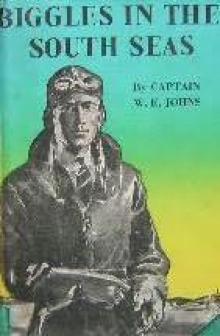 Biggles In the South Seas
Biggles In the South Seas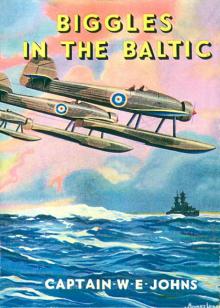 21 Biggles In The Baltic v3
21 Biggles In The Baltic v3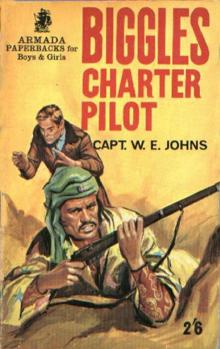 27 Biggles - Charter Pilot
27 Biggles - Charter Pilot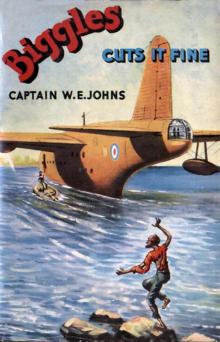 49 Biggles Cuts It Fine
49 Biggles Cuts It Fine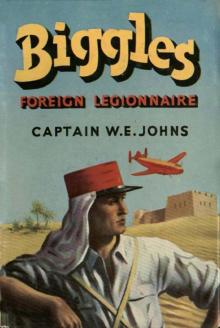 51 Biggles Foreign Legionaire
51 Biggles Foreign Legionaire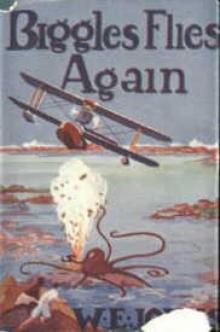 04 Biggles Flies Again
04 Biggles Flies Again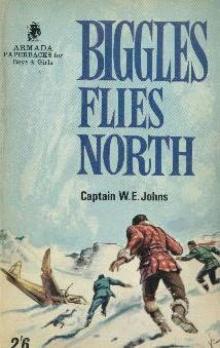 16 Biggles Flies North
16 Biggles Flies North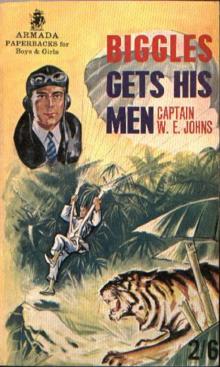 37 Biggles Gets His Men
37 Biggles Gets His Men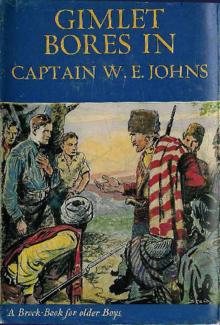 07 Gimlet Bores In
07 Gimlet Bores In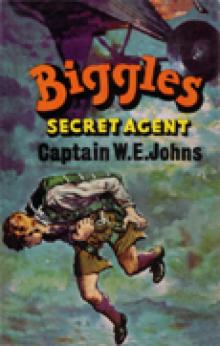 19 Biggles Secret Agent
19 Biggles Secret Agent 32 Biggles In The Orient
32 Biggles In The Orient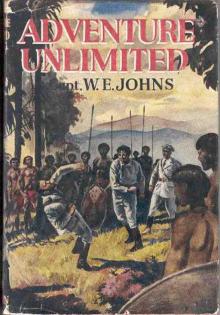 Adventure Unlimited
Adventure Unlimited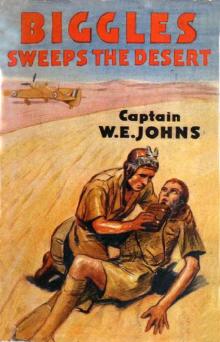 26 Biggles Sweeps The Desert
26 Biggles Sweeps The Desert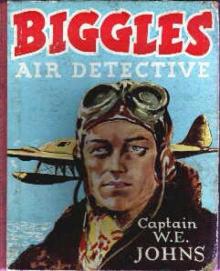 Biggles Air Detective (43)
Biggles Air Detective (43) 36 Biggles Breaks The Silence
36 Biggles Breaks The Silence 14 Biggles Goes To War
14 Biggles Goes To War 18 Biggles In Spain
18 Biggles In Spain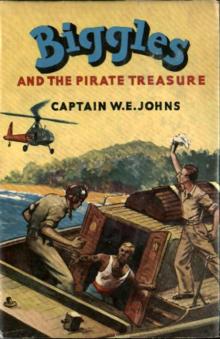 50 Biggles and the Pirate Treasure
50 Biggles and the Pirate Treasure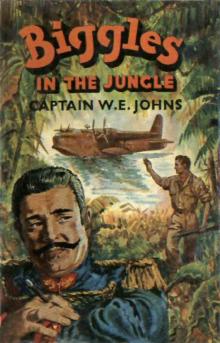 25 Biggles In The Jungle
25 Biggles In The Jungle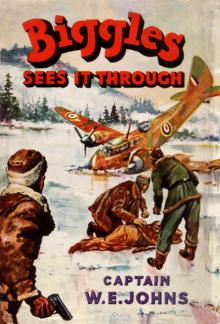 23 Biggles Sees It Through
23 Biggles Sees It Through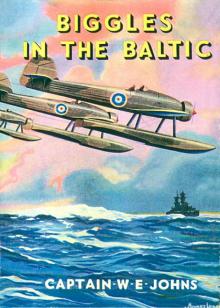 21 Biggles In The Baltic
21 Biggles In The Baltic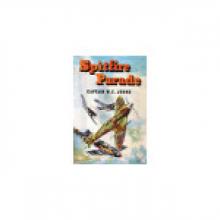 24 Spitfire Parade
24 Spitfire Parade 38 Another Job For Biggles
38 Another Job For Biggles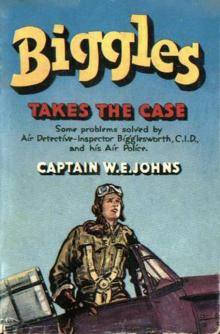 41 Biggles Takes The Case
41 Biggles Takes The Case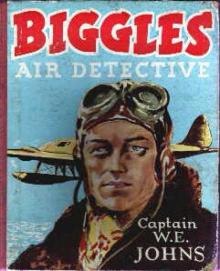 43 Biggles Air Detective
43 Biggles Air Detective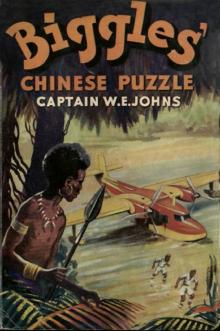 53 Biggles Chinese Puzzle
53 Biggles Chinese Puzzle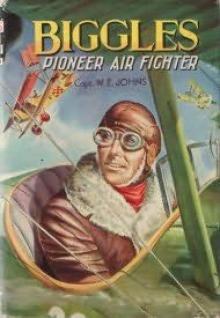 Biggles Pioneer Air Fighter (51)
Biggles Pioneer Air Fighter (51)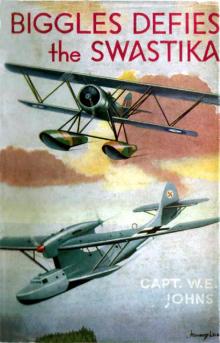 22 Biggles Defies The Swastika
22 Biggles Defies The Swastika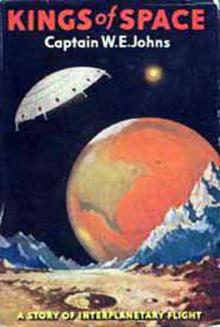 01 Kings Of Space
01 Kings Of Space